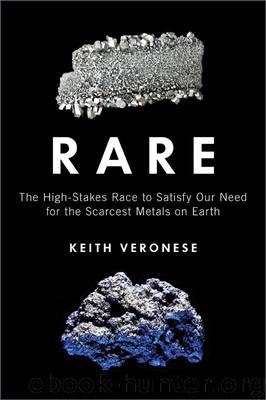Rare: The High-Stakes Race to Satisfy Our Need for the Scarcest Metals on Earth by Keith Veronese

Author:Keith Veronese [Veronese, Keith]
Language: eng
Format: epub
Tags: Technology & Engineering, Materials Science, Geopolitics, General, Political Science, Science, Chemistry
ISBN: 9781616149734
Google: IwkDBAAAQBAJ
Publisher: Prometheus Books
Published: 2015-01-06T21:00:50+00:00
DIRTY RECYCLING IN THE DEVELOPING WORLD
While the “scorched-earth” hobbyist approaches used by Ron and Anthony are dangerous, the Third World equivalent is disturbingly post-apocalyptic. Venturing into mountains of discarded monitors, desktop towers, and refrigerators, children and teenagers fight over sun-and-rain-exposed electronic parts in search of any metals—even ones the First World discards with every can of soda—for possible resale.
The disproportionate value of a dollar in world trade makes these battles worthwhile, and gives reason to collect copper, aluminum, and scrap steel that First World hobbyists often toss aside in their search for precious metals. A mere two-dollar profit margin on twelve hours’ work is not worth the effort in the First World, but this tiny sum is the difference between a tenuous hold on life and starvation for the young workers who flock to these small dumps, ignoring the long-term health risks. Along with any possible precious metals, the young prospectors harvest the copper wire that runs through a computer and crisscrosses circuit boards, the aluminum on the degaussing coils of tube televisions and monitors, as well as copper-containing condensers from refrigerators.
Electronic waste collected for recycling with the best of intentions often goes astray with items earmarked for recycling circuitously finding homes in Third World landfills. In many situations, the collecting organization has little-to-no ability to influence how the donated materials are handled after they are passed on to a third party. From this arises a number of problems since it is typically twice as expensive to refurbish or safely recycle the electronic refuse as it is to transport electronic waste designated for recycling to the shores of another country.
Dumping practices have sprinkled garbage ports of call across the world—Accra in Ghana and the village of Guiyu in China are two prime examples. These ports have also appeared in the Philippines, Vietnam, and India, preying on coastal towns where individuals are in desperate need of income.
Once electronic waste is deposited in the landfills of poor villages, the waste will not stay there for long. Locals in Accra and numerous small towns spread across India and China learned of the possibilities for parts from abandoned computer monitors, televisions, and towers and, like the hobbyists mentioned earlier, took up efforts to retrieve the precious components. In a society where economic prosperity and annual average incomes are measured in the hundreds and not tens of thousands of dollars, the few dollars one might make during a twelve-hour foray through massive piles of rubbish is well worth the effort and risk.
The electronics wastelands littered throughout developing countries could not exist, however, without complicit partners in the destination countries. How do these relationships begin?
Download
This site does not store any files on its server. We only index and link to content provided by other sites. Please contact the content providers to delete copyright contents if any and email us, we'll remove relevant links or contents immediately.
Quantitative and Pattern Recognition Analyses of Five Marker Compounds in Raphani Semen using High-Performance Liquid Chromatography by Unknown(4142)
Alchemy and Alchemists by C. J. S. Thompson(3521)
The Elements by Theodore Gray(3057)
The Club by A.L. Brooks(2925)
How to Make Your Own Soap by Sally Hornsey(2901)
Drugs Unlimited by Mike Power(2594)
Wheels of Life by Anodea Judith(2152)
Cracking the LSAT, 2012 Edition by Princeton Review(1955)
Cracking the Sat French Subject Test, 2013-2014 Edition by The Princeton Review(1881)
The Flavor Matrix by James Briscione(1834)
Perfume by Jean-Claude Ellena(1821)
The Cosmic Machine: The Science That Runs Our Universe and the Story Behind It by Scott Bembenek(1761)
The Thing Around Your Neck by Chimamanda Ngozi Adichie(1702)
MCAT Physics and Math Review by Princeton Review(1690)
1000 Multiple-Choice Questions in Organic Chemistry by Organic Chemistry Academy(1662)
Cracking the SAT Premium Edition with 6 Practice Tests, 2017 by Princeton Review(1592)
Handbook of Modern Sensors by Jacob Fraden(1583)
Synchrotron Light Sources and Free-Electron Lasers by Eberhard J. Jaeschke Shaukat Khan Jochen R. Schneider & Jerome B. Hastings(1559)
A is for Arsenic: The Poisons of Agatha Christie (Bloomsbury Sigma) by Kathryn Harkup(1548)
